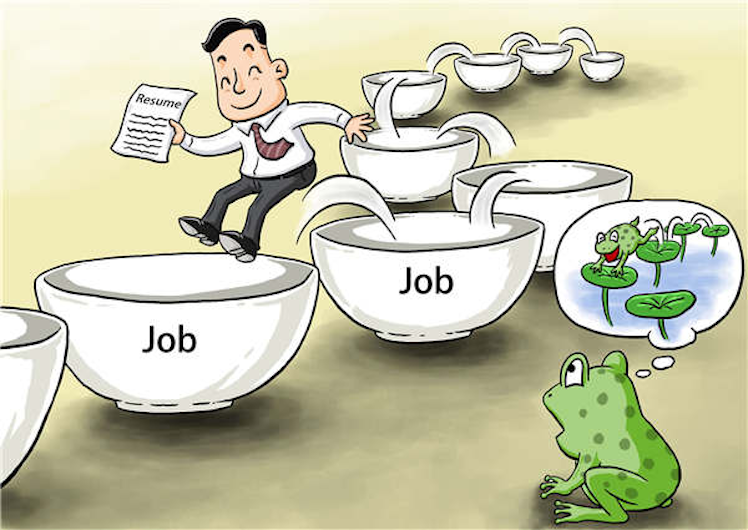Trending Assets
Top investors this month
Trending Assets
Top investors this month
The economic value of cities is diminishing
In 2021, David Perell wrote a short essay on his thoughts on San Francisco. In this essay, Perell says:
"Living in San Francisco is like an MBA for people in technology. People move there in their 20s to build their network and learn about the technology industry. Then they move away when they’re ready to have kids. Cities as a networking tool is fueled by the end of lifetime employment. Employees can’t expect lifetime employment anymore, so they build career stability through strong professional networks that stay with them even as they jump between jobs."

Job-hopping Generation (source)
What's interesting about this observation is that the network one gets from living in SF was easily attainable during the pre-pandemic days. But now, because remote work has become widespread and normalized, many people choose to live outside SF where rent is cheaper and they get more space for the amount of money they're paying. Job hopping became popular during the pre-pandemic days simply because of the networks people were able to build when they were once living in cities. Though young people continue to move to cities after college simply to be closer to work, it's harder to develop a network that can help them job hop from one company to another. That's why many are aiming to get jobs in large and prestigious companies early in their career so that the weight of their former employer's prestige can introduce them to more opportunities down the road.
While fundraising remains the biggest benefit of living in SF, having a strong network and a large online audience provides the same value to you whether you live in SF or in Oklahoma. Only when you're going to raise capital is when you'll need to buy a plane ticket to be in SF.

Some will say that as more members of Gen Z moving to the cities and pushing rent prices to new highs, that the value and magic of cities will remain. In my view, it's likely that cities will soon be filled with mostly young professionals as the older and higher-up professionals choose to live away from cities. While this helps Gen Z make more friends, the value of the network that they can create becomes questionable. Unless many of these people are big influencers who can create jobs out of thin air, by losing opportunities to network with higher-up professionals, it becomes harder to find people that can help you get that new job. A recruiter would be more willing to listen to a recommendation from a director of the company than from someone who has worked in the company for only a year. Meanwhile, people are finding that by creating content on Twitter and LinkedIn, they're able to connect with industry experts and build the networks that people were once able to simply by living in the city. See my point?
As more and more people realize the declining value of living in cities, we will be a bigger emphasis on living in cheaper areas to boost one's disposable income and a newer emphasis on asset accumulation. With more young professionals living with parents, those people are able to invest more in their brokerage accounts and slowly become less dependent on their wages for income. No longer does one need to live in a city to increase their odds of success. If anything, living in a cheap city and having disposable income puts a person more ahead in life than living in the expensive but exciting big city and struggling to get any disposable income by the end of each month.
The value of cities is diminishing.
www.chinadaily.com.cn
Job-hopping generation
Young people born after 1990 grew up in an era of relative affluence, and change employers frequently for individual goals.
Already have an account?